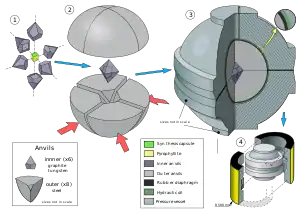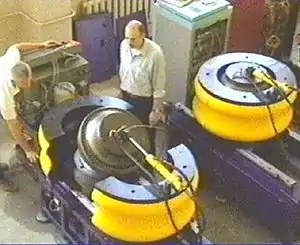BARS apparatus
BARS (or "split sphere", transliteration from Russian: БАРС abbreviation of Russian: Беспрессовая Аппаратура Высокого Давления «РАЗРЕЗНАЯ СФЕРА», (bespressovaya apparatura vysokogo davleniya «razreznaya sfera»), "press-free high-pressure setup «split sphere»") a high-pressure high-temperature apparatus usually used for growing or processing minerals, especially diamond and boron nitride.[1] Typical pressures and temperatures achievable with BARS are 10 GPa (99,000 atm) and 2,500 °C (4,530 °F; 2,770 K).[2][1]


The BARS technology was invented around 1989–1991 by the scientists from the Institute of Geology and Geophysics of the Siberian Branch of the Academy of Sciences of the USSR.[2] In the center of the device, there is a ceramic cylindrical reaction cell of about 2 cm3 in size. The cell is placed into a cubic-shaped pressure-transmitting material, which is pressed by elements made from cemented carbide (VK10 hard alloy).[3] The outer octahedral cavity is pressed by 8 steel sectors. After mounting, the whole assembly is locked in a disc-type barrel with a diameter ~1 meter. The barrel is filled with oil, which pressurizes upon heating; the oil pressure is transferred to the central cell. The central cell is heated up by a coaxial graphite heater. Temperature is measured with a thermocouple. The exterior size is 2.2 х 1.0 х 1.2 meters. Weight of the sphere is 2.8 tonnes (6,200 lb). Claimed energy consumption is in between 1.5 - 2 kWh.[4]
The growth rate for 5 carats (1.0 g) type Ib (yellow, nitrogen-rich) crystals using Fe–Ni catalyst reaches as high as ~20 mg/h towards the end of 100 h growth cycle, i.e. crystals of 5 carats (1.0 g) to 6 carats (1.2 g) can be grown in less than 100 h.[5]
See also
References
- "Беспрессовая аппаратура высокого давления "РАЗРЕЗНАЯ СФЕРА" (БАРС)". www.igm.nsc.ru (in Russian). Retrieved 2018-05-16.
- N. Pal'yanov; et al. (2002). "Fluid-bearing alkaline carbonate melts as the medium for the formation of diamonds in the Earth's mantle: an experimental study". Lithos. 60 (3–4): 145. Bibcode:2002Litho..60..145P. doi:10.1016/S0024-4937(01)00079-2.
- M. G. Loshak and L. I. Alexandrova (2001). "Rise in the efficiency of the use of cemented carbides as a matrix of diamond-containing studs of rock destruction tool". Int. J. Refractory Metals and Hard Materials. 19: 5. doi:10.1016/S0263-4368(00)00039-1.
- "Беспрессовая аппаратура высокого давления "РАЗРЕЗНАЯ СФЕРА" (БАРС)". www.igm.nsc.ru (in Russian). Retrieved 2018-05-16.
оптимальные габариты (2,2 х 1,0 х 1,2 м) и масса установки (2,8 т); высокая экологичность и безопасность; низкая энергоемкость (1,5 - 2 квт/час); заменяемость многопуансонного блока в зависимости от задач
- R. Abbaschian; et al. (2005). "High pressure–high temperature growth of diamond crystals using split sphere apparatus". Diam. Rel. Mater. 14 (11–12): 1916. Bibcode:2005DRM....14.1916A. doi:10.1016/j.diamond.2005.09.007.
External links
| Wikimedia Commons has media related to Synthetic Diamond. |